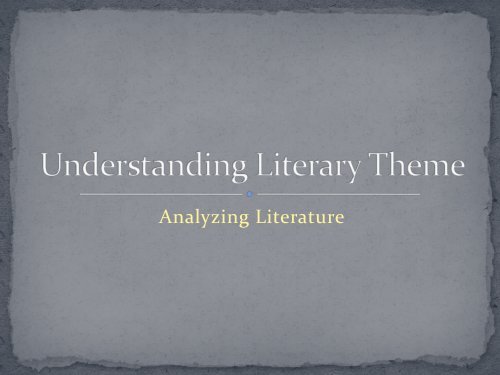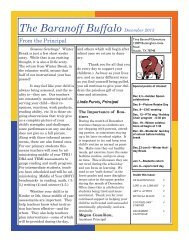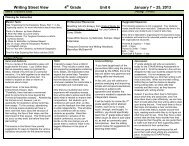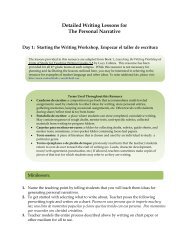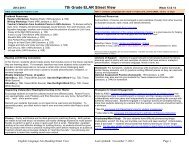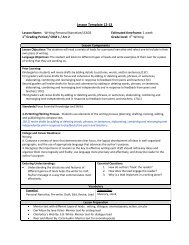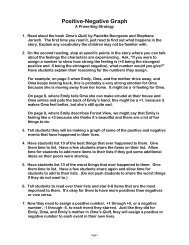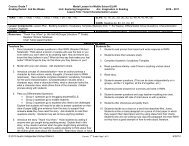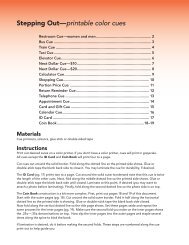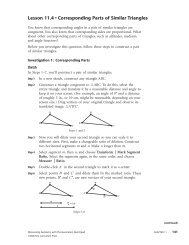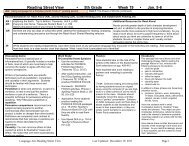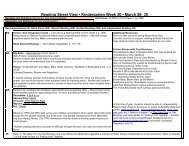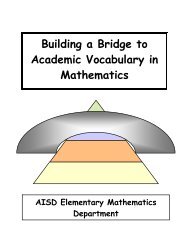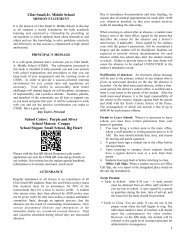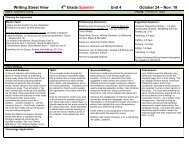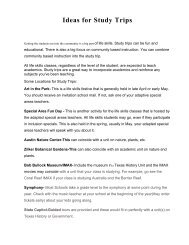Understanding Literary Theme
Understanding Literary Theme
Understanding Literary Theme
You also want an ePaper? Increase the reach of your titles
YUMPU automatically turns print PDFs into web optimized ePapers that Google loves.
Analyzing Literature
<strong>Literary</strong> <strong>Theme</strong> in the TEKSIn the state of Texas All Elementary Studentsare expected to:Analyze, make inferences and drawconclusions about theme and genre in differentcultural, historical, and contemporary contextsand provide evidence from the text to supporttheir understanding.
<strong>Literary</strong> <strong>Theme</strong> in the TEKSAt different grades, students are expected to:Kindergarten – 6(B) discuss the big idea (theme) of a well-knownfolktale or fable and connect it to personal experience1 st Grade – 7(A) connect the meaning of a well-known story or fable topersonal experiences2 nd Grade – 6(A) identify moral lessons as themes in well-known fables,legends, myths, or stories3 rd Grade – 5(A) paraphrase the themes and supporting details offables, legends, myths, or stories4 th Grade – 3(A) summarize and explain the lesson or message of awork of fiction as its theme5 th Grade – 3(A) compare and contrast the themes or moral lessons ofseveral works of fiction from various cultures
What is <strong>Theme</strong> in Literature?When you are talking about literature, one ofthe most important things you need to discussis the “Central <strong>Theme</strong>” of the text.The <strong>Theme</strong> refers to the central idea orunderlying message of the text. The <strong>Theme</strong> israrely stated in the text – instead, the readermust usually consider the plot, characters, andsetting to infer the theme.
What is <strong>Theme</strong> in Literature?<strong>Theme</strong> is often confused with other literaryelements such as Plot or Topic (or Subject)However, the <strong>Theme</strong> of a piece of literature is amessage about people, life, and the world welive in that the author wants the reader tounderstand.The Topic, on the other hand, is the main ideaor gist of the story.
What is <strong>Theme</strong> in Literature?For example, think about the Topic and <strong>Theme</strong>of the classic story Cinderella.If you are describing the TOPIC, you might sayit is a story about a poor girl who marries aprince.But if you are describing the THEME, it couldbe described as an example of karma or goodthings happening to good people.
What is <strong>Theme</strong> in Literature?Charlotte’s WebTopicA talking spiderhelps a pig.<strong>Theme</strong>(s)Self-SacrificeTrue FriendshipPerseverance
What is <strong>Theme</strong> in Literature?The Ugly DucklingTopicAn ugly ducklinggrows up to becomea beautiful swan<strong>Theme</strong>(s)PatienceSelf-ConfidenceIndividuality
What is <strong>Theme</strong> in Literature?The Wizard of OzTopicA girl goes on anadventure in a magicland.<strong>Theme</strong>(s)FriendshipAppreciate What YouAlready haveThings You Seek AreAlready Inside You
What is <strong>Theme</strong> in Literature?Similarly, somebody might describe the“theme” of Pink and Say or Mercedes and theChocolate Pilot as stories about war.But in these cases, war is the setting – itinfluences the theme, but it is not the theme.Both of these books deal with themes offriendship and philanthropy in a time of war.
What is <strong>Theme</strong> in Literature?The theme can also be described in terms of amoral, or message, or lesson that the readercan gain from the piece of literature.The Tortoise and the Hare is a lessonin perseverance.The Gingerbread Man isa lesson in arroganceand the folly of pride.
Identify the <strong>Theme</strong>Now you try it.Which of the following is the THEME of TheMidas Touch?A. A king gains magic powers.B. Magic can cause problems.C. Greed never leads tohappiness.
Identify the <strong>Theme</strong>Now you try it.Which of the following is the THEME of CityMouse Country Mouse?A. A country mouse visits his cousin in the city.B. A mouse discovers he does not like the city.C. Be grateful for what youalready have.
Identify the <strong>Theme</strong>Now you try it.Which of the following is the THEME of HortonHears a Who?A. An elephant struggles to save a community.B. Elephants have very good hearing.C. True friendship knowsno boundaries.
Identify the <strong>Theme</strong>Think about studying theme across differentworks of literature with your class.How many stories can you think of that have acentral theme of:• Friendship?• Generosity?• Self-Sacrifice?• Honesty?
<strong>Theme</strong> Instruction and RigorNotice that “Identifying” the <strong>Theme</strong> is a 2 ndGrade expectation.Students in 3 rd and 4 th grade should be able toExplain the theme by providing details from thetext.By 5 th Grade, students should be able tosynthesize and compare themes acrossmultiple works of literature.
Try it with your studentsAs you read with your students, ask them toanalyze the theme of the text. What message isthe author trying to give them? What lesson arethey learning?Ask your students to make thematic connectionsacross texts. How many stories do they knowwhere good conquers evil? How many storiescan they think of where people get what theydeserve?
Try it with your studentsBy 5 th Grade, students should be able to explainhow the themes in the classic story PipiLongstocking, for example, are reflected incontemporary stories like Maniac McGee orThe Lightning Thief.Similarly, they should be able to cite examplesfrom the text to explain how the theme of“Perseverance” is revealed in stories like TheCay, Hatchet, and The Carrot Seed.
Try it with your studentsTeaching theme also provides opportunities toteach common English idioms:• You Reap what you Sow• It is always darkest just before the dawn• The Grass is Greener on the other side of the fence.• Pride Goeth Before the Fall• Honesty is the Best PolicyThese idioms are often the moral for manyclassic children’s stories, so students can usethese common expressions when discussingthe theme of books they are reading.
Try it with your studentsWhen working with your students, be sure toteach at the DEPTH and SOPHISTICATIONexpected in the grade-level expectations in theTEKS.Do not, for example, just ask 5 th grade studentsto IDENTIFY the <strong>Theme</strong> – ask them to ANALYZE,EXPLAIN, and COMPARE the theme in multipleworks of literature.


